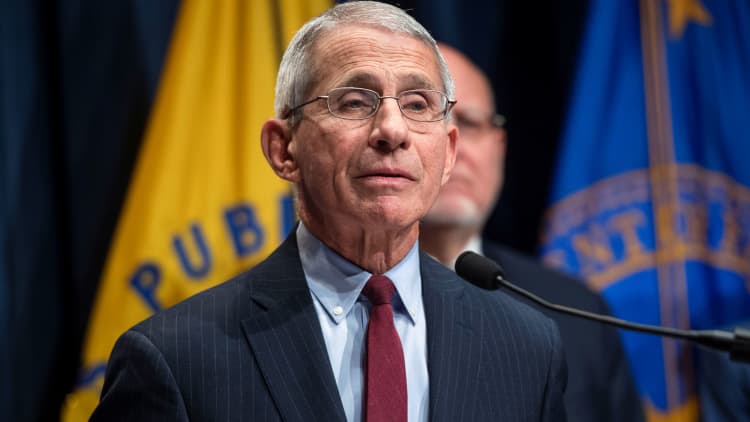
China may be reporting fewer new cases of coronavirus and fewer infection-related deaths, but it does not mean the country's outbreak is slowing, immunologist Anthony Fauci told CNBC on Tuesday.
"I think we need to give it a few more days to determine if that's real or if that's the variability that you generally see," Fauci, a member of President Donald Trump's coronavirus task force, said on "Closing Bell."
Fauci, who is the director of the National Institute of Allergy and Infectious Disease, was referencing reports Tuesday that the number of new daily cases in China fell below 2,000 for the first time since Jan. 30.
Chinese officials also reported 98 deaths, the first time the daily toll was below 100 since Feb. 11, according to Reuters.
There are more than 73,400 confirmed coronavirus cases globally, the vast majority of which are still in China. Most of the 1,874 deaths have taken place there, too.
A top World Health Organization official also urged restraint when interpreting the new data. WHO Director-General Tedros Adhanom Ghebreyesus said it "appears to show a decline in new cases," but any trend "must be interpreted very cautiously," according to Reuters.
Fauci said China's domestic strategy to contain the virus was not a typical strategy, but he suggested it may prove to be effective.
"The degree with which they have shut down travel through major cities, encompassing about 50 million people including the entire 11 million person city of Wuhan ... is really unprecedented," he said. "Their decision to do that was their desire to make sure that the virus does not spread further throughout China, but also outside of China into other countries."
"It might actually work, as unusual as such a move is to stop an outbreak," he added.
There are some signs that economic activities in China are resuming after extended holiday manufacturing shutdown due to the COVID-19 outbreak.
General Motors, Fiat Chrysler and Toyota Motor said Tuesday they've reopened their factories or are beginning to restart production in China.
The CEO of Oreo-maker Mondelez, Dirk Van de Put, also said Tuesday the company has reopened its four plants in China. But they are not yet operating at full capacity, he said.



